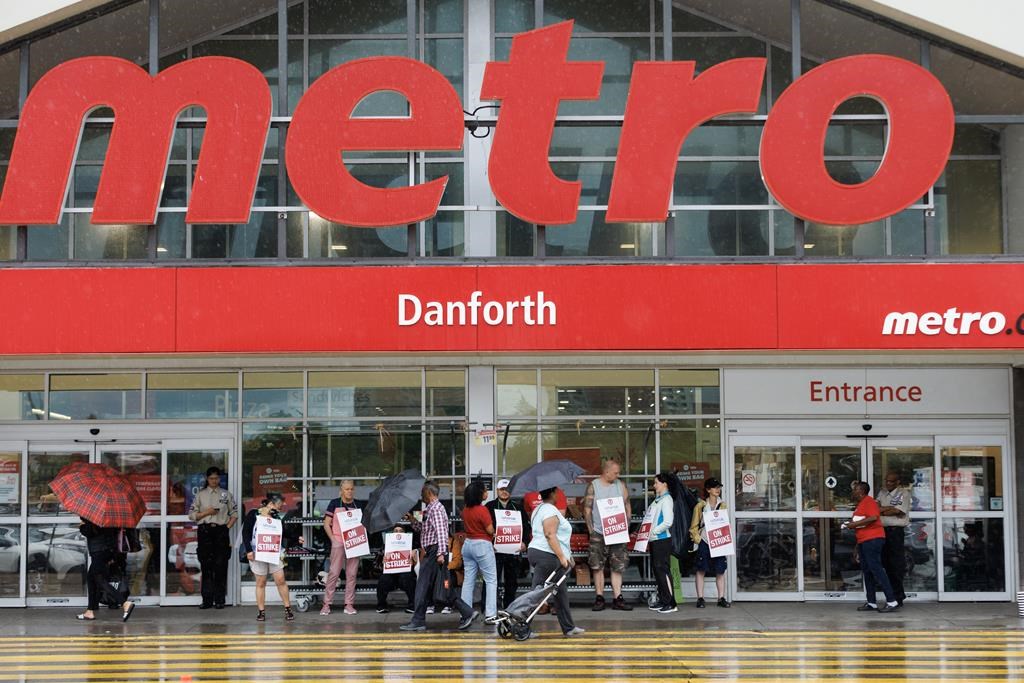Toronto-area Metro workers ratify second tentative agreement after month-long strike

TORONTO — Metro workers from 27 stores in the Greater Toronto Area have a new collective agreement after a month-long strike, the union said Thursday.
The workers represented by Unifor voted to ratify a second tentative deal just two days after Metro was granted a temporary injunction restricting secondary picket lines that blocked fresh product deliveries to its stores.
“Workers made it abundantly clear that they needed to see real wage gains in the first year of the agreement to address the affordability issues they currently face, which is exactly what we accomplished in this new contact,” said Unifor Local 414 president Gord Currie in a statement.
Advertisement
Unifor spokesman Paul Whyte said in a statement that under the new five-year deal, which the union is calling “historic,” all workers will get an immediate raise of $1.50 an hour.
He said full-time and senior part-time workers will get an additional 50-cent raise in January, bringing their total pay increase over the coming months to $2-an-hour.
Metro senior vice-president Joe Fusco said in a statement that the grocer is pleased to have reached a fair and reasonable deal, and looks forward to welcoming workers and customers back to the 27 affected stores on Tuesday, Sept. 5 (Metro said the delay in reopening is for restocking, as the stores have been closed for more than a month).
“Our store employees benefit from wages and working conditions among the highest in the industry, and the new contract maintains those standards. For its part, the company improved its operational flexibility to function effectively in the country’s most competitive marketplace,” said Fusco.
More than 3,700 workers had been on strike since July 29 after rejecting the first tentative agreement recommended by their bargaining committee. As the dispute ramped up, workers set up secondary pickets at two GTA distribution warehouses, which the grocer said halted deliveries of produce, meat and dairy to its stores across Ontario for several days.
Advertisement
The wage improvements were front-loaded to get more money in workers’ pockets faster, and so they would compound over time, said Whyte. These improvements translate into more than $33,000 in new earnings for the average full-time and senior part-time worker over the lifetime of the agreement, he said.
“This was a hard-fought struggle,” said Stephanie Ross, an associate professor in the school of labour studies at McMaster University.
Front-loading the raises is a “big win” for Metro workers, as it helps offset — though not fully erase — the sting of losing ‘hero pay’ during the pandemic, said Ross.
Throughout the strike, the workers called for the so-called hero pay they received during the pandemic to return, as well as better working conditions and more full-time jobs.
The hero pay became the rallying cry for Metro workers amid the drawn-out dispute, said Ross.
Advertisement
“The way in which the loss of the hero pay was so inflammatory that workers were willing to go on strike to, in some ways, get it back, tells the grocery store employers: ‘You made an unforced error removing pandemic pay,’” she said.
If they hadn’t done that, it’s possible the sector wouldn’t be facing such a “serious labour relations conflict” right now, she said.
Unifor has previously said it intends to set a pattern with the Metro agreement, as it has more than a dozen collective agreements with the grocers set for bargaining over the next two years.
“This agreement sets the floor now for those future negotiations. And it’s also clearly why Unifor was willing to put so much energy and resources and effort behind a strike in this round, because they wanted to set a good floor that they can extend to other bargaining tables,” Ross said.
“It’s going to be very hard for employers at those tables to argue that they can’t match this agreement. And, you know, I think they also see very clearly that Unifor is willing to take strike action in order to fight for this benchmark.”
Advertisement
Ross noted the length of the agreement, which at five years is longer than what’s become standard in labour relations. A lot can change over five years, she said.
“That does mean that it’s hard for the union to respond to changing conditions,” she said, such as inflation.
The union did not release details on what percentage of workers voted in favour of the agreement.
The voting percentages can tell a lot about how divisive the agreement was, said Ross, adding it wouldn’t surprise her if the ratification wasn’t a resounding one.
But she said it’s not necessarily a negative for it to not be unanimous.
Advertisement
“It’s not a bad thing for either the employer or the union leadership to hear that members … expect more, which is what we’ve been observing for this past year,” she said.
“Workers are expecting more out of their work and out of the economy than they have been in quite some time. And they’re willing to fight for it.”
This report by The Canadian Press was first published Aug. 31, 2023.
Companies in this story: (TSX:MRU)
Advertisement
Rosa Saba, The Canadian Press